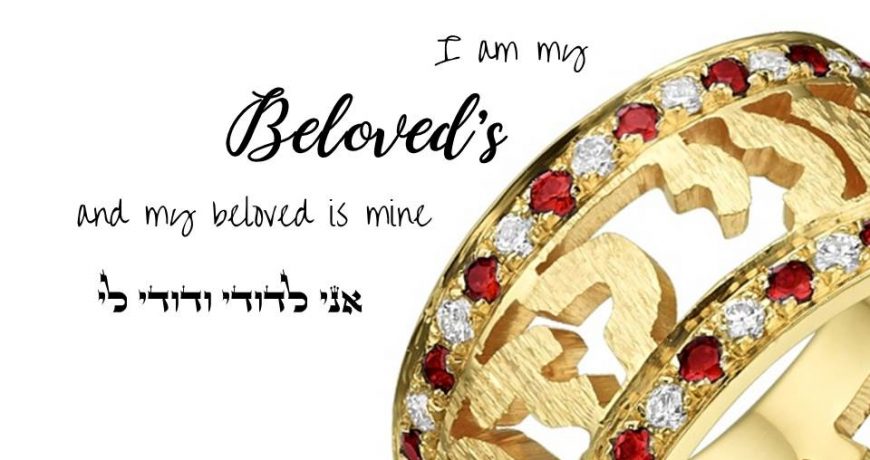אני לדודי ודודי לי
I am my beloved’s and my beloved is mine.
Who hasn’t seen this quote at weddings, decorating the chuppah, the ketubah, the invitations, and even the couples’ wedding rings? There’s no question that it’s a beautiful sentiment and a popular choice. But as we all know, nothing in Judaism is without a deeper, hidden meaning. So, where does this famous Hebrew love verse come from and what does it really mean?
Ani Ledodi was written over 2000 years ago in the city of Jerusalem by the Jewish king of Israel himself, King Solomon. Solomon was actually a prolific writer, authoring many sagacious works which showcased his immense wisdom and insight. Perhaps the most well-known and well-read of his books is the poetic love story, Shir HaShirim, The Song of Songs. As Rabbi Jack Abramowitz writes:
On the surface, it is a beautiful love story, at times bordering on erotic poetry. There would seem to be little place for such a thing in the Bible. And yet, the Mishna in Yadayim (3:5) says that the entire world was never more deserving than the day on which Shir HaShirim was given to Israel. Why? Because “all the Writings are holy, but Shir HaShirim is the holy of holies.”
He goes on to explain:
The Book is taken to be a metaphor for the relationship between G-d and Israel. In the metaphor, G-d plays the role of the man and Israel plays the woman. (This is a common metaphor; throughout the Bible, the relationship between G-d and Israel is described as a marriage, with the revelation at Sinai being the wedding.)
So, this immense work is full of beautiful verses poetically declaring the love and passion between G-d and Israel, or man and woman. But why is Ani Ledodi the most famous one of all?
To start with, we need the baseline understanding that any text included in the Jewish Biblical canon (the Tanakh) was written with ruach hakodesh, Divine inspiration. The Song of Songs is no exception, and therefore nothing in the text is arbitrary or subject to the whims of mans’ interpretations. Any deeper meaning found within the text is there for a reason and meant to be found. Nothing in Tanakh is an accident.
With this understanding we can now look at a reason for why the Ani Ledodi verse has become so popular and well-known—surely no coincidence. When you take the first letter of each word in the verse,
אני לדודי ודודי לי Ani Ledodi V’dodi Li
You get:
א-ל-ו-ל E-L-U-L
The twelfth month of the Jewish calendar, the month leading up to the High Holidays, Rosh Hashanah and Yom Kippur. As we said before, this acronym is no coincidence. What is the significance of the month of Elul and what is its connection to Ani Ledodi?
During the month leading up to The Day of Judgment, Rabbi Schneur Zalman of Liadi (18th century) teaches us, “the King is in the field.” This means that G-d, the king, makes Himself accessible to us. Instead of His normal place behind palace walls, during this time He is out in the field for us to simply go out and talk with Him, pray, ask for forgiveness, and spill our hopes and desires. G-d says during Elul, “If I am your beloved, then you are Mine. Come just a step towards me and I will come the rest of the way.” Elul is the month that epitomizes “I am my beloved’s and my beloved is mine.”
Furthermore, this verse illustrates the reciprocal nature of our relationship with G-d. Not only do we love and worship G-d and praise His Name—He does the same for us. Just as Jewish men put on tefillin (phylacteries) everyday which contain praises of G-d, the Talmud B’rachot 6 tells us G-d also puts on tefillin every day, but His contain praises of the Jewish people. (Kedushat Levi, Exodus, Bo. Sefaria.org).
Thus we come to the true meaning of Ani Ledodi: “My beloved and I only exist for the sake of each other.” This raw, passionate love is how we are taught to love G-d. The great scholar and philosopher Maimonides expounds on the proper form of the love of God:
It is that he should love Hashem (G-d) with a great, overpowering, fierce love as if he were love-sick for a woman and dwells on this constantly… And it is to this that Solomon refers allegorically when he says: ‘For I am faint with love’ (Song of Songs 2:5) for the whole of Song is a parable on this theme.” (Hilchot Teshuvah, 10:3).
From G-d’s point of view, He created us purely to serve us and bestow good upon us. While simultaneously from our perspective, we were created to serve G-d and do good to His creations. This is the essence of a happy marriage. Don’t think about what your partner should be doing for you; think only about what you could be doing for your partner. Love and give to your partner only from a desire to be close to them, not thinking about what you will receive in return.
This, is the secret to an everlasting marriage that Ani Ledodi comes to impart.
Shop Ani Ledodi Jewelry and Wedding Rings.


Can you make this in a size 4.25
Yes, we can! Here is the link to the ring in the picture https://www.baltinesterjewelry.com/product/ruby-diamond-ani-ledodi-wedding-ring-14k-yellow-gold/